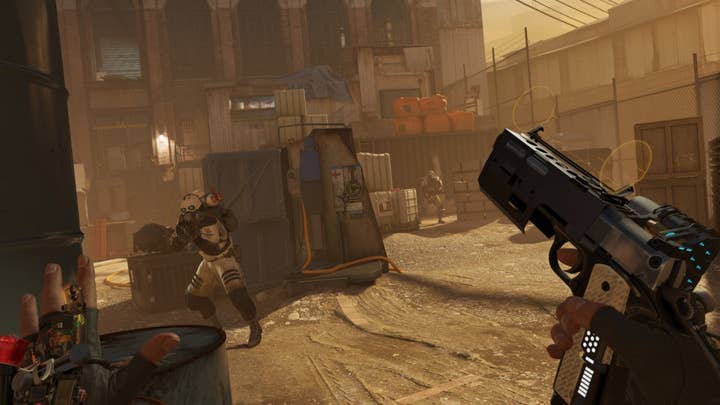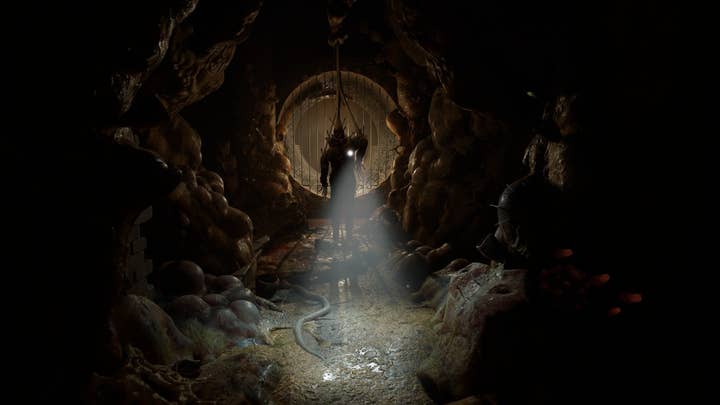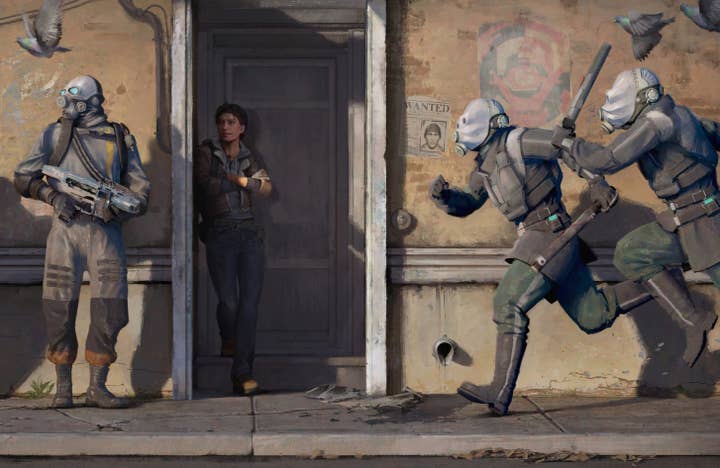Half-Life: Alyx -- Critical Consensus
Critics praise the frightening, tactile and brilliantly detailed return of Half-Life -- but will it be 13 years until the next one?
Whatever else can be said about 2020 so far, the video game release schedule has emerged from its fallow period in fine style. The drought of the early months has been replaced by a deluge: Moon Studios' Ori and the Will of the Wisps, id Software's Doom Eternal, and Nintendo's Animal Crossing: New Horizons, each praised as a high watermark in their respective genres.
Yesterday brought arguably the biggest of all -- in terms of stature if not projected sales. Half-Life: Alyx is the first game in Valve's iconic franchise since 2007, and it's no exaggeration to suggest that this game has been demanded literally every day of the 13 years that have passed since then. The fact that it's both a virtual reality exclusive and doesn't have a "3" in the title are huge caveats, but they don't stop Half-Life: Alyx from being a very big deal indeed.
The former will severely limit the number of people the game can reach, though. The VR market is still very much a niche concern despite years of diligent effort from its major stakeholders, and fans who have waited more than a decade for a new Half-Life game are not entirely happy it will only be available to a small market with such a high cost of entry.
"This feels like a natural conclusion to Half-Life 2's revolution in physics"
Rock Paper Shotgun
That disappointment has been dismissed by some with the argument that "Valve doesn't care about sales," but that logic only goes so far. The Seattle-based company needn't make a dollar in profit, of course, but there is a reasonable argument that it should care a little bit more about serving the audience that helped set the foundations of its business. Valve was formed around Half-Life, after all, and Steam was established through Half-Life 2.
In an interview published yesterday, Valve's Sean Vanaman told us: "It was really important for us that fans didn't feel we were dragooning them into a purchase [of the Valve Index] by holding a franchise they cared about hostage." That perception is mostly beyond the control of Valve's developers, but with Half-Life: Alyx, they have at least made a convincing argument that VR is essential to pushing the series forward.
Rock Paper Shotgun's Graham Smith argues that Half-Life: Alyx makes a persuasive case for VR from its very opening moments -- specifically in a first encounter with one of the series' iconic enemies.

"VR conveys scale in a way other games cannot, and gazing up at the under-construction Citadel gave me tingles," Smith said. "It also gave me a whole new appreciation for the intimidating size and dexterity of Striders, who clamber across rooftops on needle-sharp legs, like angry chopsticks in search of a dumpling."
The most obvious impact of VR is found in the very big, but also in the smallest details. Motion controllers -- and particularly those for the Valve Index, which offer peerless fidelity of hand- and finger-tracking -- allow the user to reach out and interact with virtual objects in a natural way. Every critic has heaped praise on both the attention Valve has paid to those objects, and the moment-to-moment satisfaction of exploring the game's environments.
"To help with this, you have the Russells, a pair of gravity gloves which allow you to target objects beyond your reach and flip them towards you," Smith said. "They're a good example of Valve's design skill: while flipping and catching quickly becomes second nature, the Russells remain satisfying to use every time, and they solve problems relating to movement and constrained play spaces in home VR setups.
"Half-Life: Alyx throws more and more enemies at you each time you wind up in an open space"
Kotaku
"This feels like a natural conclusion to Half-Life 2's revolution in physics. That game introduced settings like Kleiner's labs, where players were encouraged to poke around shelves, tinkering with objects and machinery in ways that were unprecedented for the time. HL:A pushes this to the nth degree.
"You will spend the game doing three main things: shooting enemies, hacking and repairing machinery, and rummaging around in cupboards. As I moved through the city's factories, distilleries and apartment buildings, I came to think of Alyx Vance as a very hungry contractor. I'd fix some wiring, then go looking in the cupboards for something to eat, only to find nothing but shotgun shells and ammo clips."
This attention to fine detail also applies to the combat, with each gun requiring a degree of interaction that is practically unheard of in traditional first-person shooters. As Polyon's Ben Kuchera stated in his review, the effect is to let the player know that they're "handling something with multiple moving parts."
"But it's not so complex that it becomes a burden. The handgun, the first weapon you're given, is a great example. To use it, you have to grab a magazine out of your backpack, slam it into the grip, and pull the slide to put a round in the chamber.
"Reloading is done by hitting a button to drop the depleted magazine onto the ground, and repeating those same actions listed above. It sounds simple, but wait until you're crouching behind a pile of cinder blocks, pulling magazines out of the environment toward you, loading them and racking a round before physically standing up and returning fire as bullets whiz past your head. It's a workout that feels like an action movie, and the rest of the weaponry you find... is a variation of this basic formula.

"The Half-Life: Alyx developers at Valve exhibit a mastery of their craft. They introduce an idea, give the player the time and opportunity to play with that idea without any pressure, and then put them in a situation where they have to test that mastery as the pressure is increased."
For Kuchera, the escalating difficulty of the combat scenarios is "expertly handled," but not every critic agreed. Kotaku's Nathan Grayson, while generally impressed with what Valve has achieved, stated that "VR becomes a liability rather than an immersion enhancer" with both the game's puzzles and its combat -- a delicate balance in a VR game, "where the line between fun and frustration is thin."
"In its apparent rush to feel like a proper first-person shooter instead of a VR shooting gallery, Half-Life: Alyx throws more and more enemies at you each time you wind up in an open space. These enemies are certainly more stationary than standard FPS baddies, but they still follow you, flank you, throw grenades to flush you out of cover, and send manhacks to hunt you down.
"Alyx feels like a bunch of Ravenholm fanboys got together and wondered what it's like to make a full game out of it"
Vice
"Initially, this is exciting... But these fights quickly devolve into awkward games of Ring Around The Rosie where you're fleeing around combat arenas using stop-start warp controls and herky-jerky analog stick-based turning to occasionally blast enemies before resuming your short-distance teleport-sprint to new cover. It's just not an ideal control configuration for that kind of sustained locomotion or situational awareness... It just doesn't feel natural in a fast-paced combat scenario."
For the most part, though, Half-Life: Alyx leans more into horror than action. Numerous reviews noted this tonal shift away from previous games in the series, but nobody states it more plainly than Vice's Patrick Klepek: "I did not anticipate Alyx is, essentially, Valve making a horror game. It's scary as fuck."
"The headcrab is scary again, and this is, in microcosm, why Alyx works," Klepek wrote. "It's a slower paced game, where you're expected to patiently and methodically comb through each area, and where combat is equal parts intimidating and thrilling. More than once, I took a deep breath before entering an area sure to be teeming with enemies, whether grotesque horrors or soldiers, because of how quickly my heart was likely to start racing.
"One thing I want to stop and emphasize: this is, more than anything, a horror game. There are moments in the sun, there are times when you fight humanoid Combine enemies, but the vast majority is Alyx is spent combating and avoiding unknown horrors. It's the most high-profile horror game since Resident Evil 7, a game I adored, but I don't know that Valve has properly informed the public for how far they lean into this. Alyx feels like a bunch of Ravenholm fanboys got together and wondered what it's like to make a full game out of it."

While Klepek offered this assessment as praise, it's fair to assume that such an intense experience won't be to everyone's taste -- but that subjective challenge doesn't make Half-Life: Alyx any less of an achievement, and one that ends as well as any game in the series. PC Gamer's Christopher Livingstone played the final three hours in one sitting, having only ever used VR for 30 minutes at one time previously.
"I don't get motion sick but I do get generally tired of VR. Tired of having a hunk of plastic strapped to my face, of having to stand and stoop and reach awkwardly around, of not being able to check my phone or have a sip of coffee. But I didn't take a break, or even want to, during the final chapters of Half-Life: Alyx. I wasn't tired. I was completely enthralled and unwilling to stop playing."
PCGamesN's Dustin Bailey found the game's final levels to be "astounding," drawing a perhaps foolhardy conclusion from the way the ending "does its damnedest to open the Half-Life universe to new stories again."
"By the end," Bailey wrote, "it feels like Valve is grabbing you by the shoulders, screaming 'we are going to make more Half-Life games!'"
This optimism is found in a number of reviews, but after 13 years of pestering Valve for more Half-Life only to be given an (evidently brilliant) exclusive for a niche platform, it's unclear exactly how the company sees the future of the series. Perhaps Rock Paper Shotgun's Graham Smith put it best, in a slightly melancholy parting shot to his otherwise glowing review.
"But mainly I just yearn for more Half-Life, in whatever form Valve wants to deliver it. It was about three hours after reaching the game's thrilling, won't-spoil-it, can't-wait-to-talk-about-it conclusion that a thought occurred to me: for a brief moment I had had a new Half-Life game to play, and now, again, I had not.
"I hope I don't have to wait for brain-computer interfaces to exist before the series returns again, because despite a handful of complaints, I still think Valve make the best first-person shooters around."

